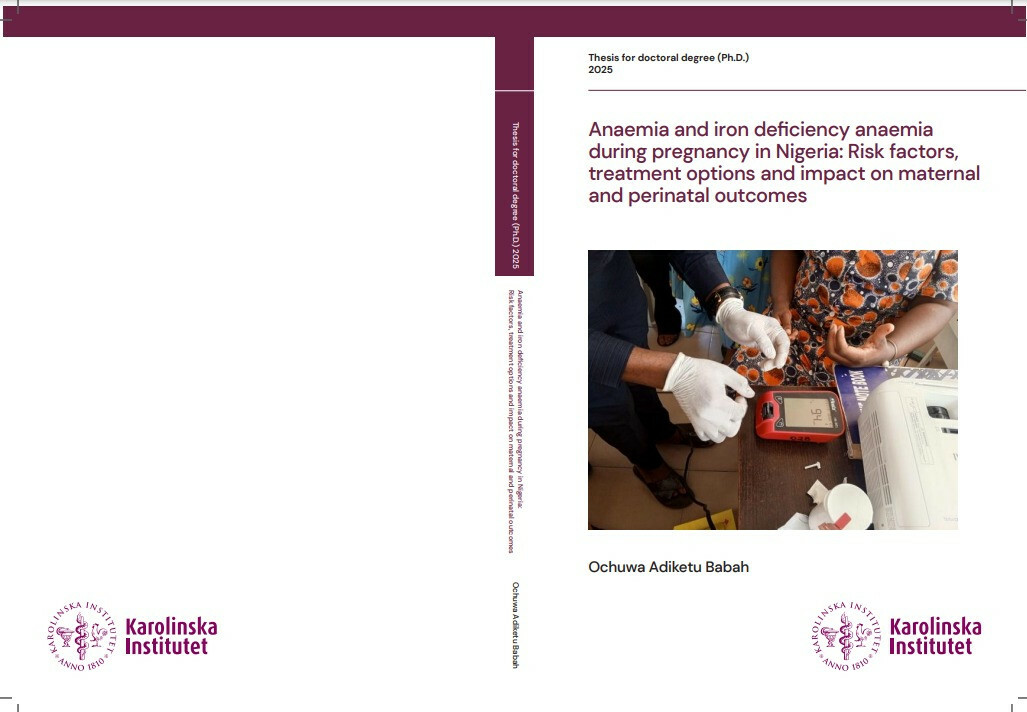PhD defence Ochuwa Adiketu Babah
Inghesalen, Widerströmska huset, Karolinska Institute, Tomtebodavägen 18 A, Stockholm
Montrer l'itinéraire
Supervisors
Prof. dr. Lenka Benova (ITM),
Prof. dr. Elin C. Larsson (Karolinska Institute, Sweden),
Prof. dr. Claudia Hanson (Karolinska Institute, Sweden),
Prof. dr. Bosede Bukola Afolabi (University of Lagos, Nigeria)
Abstract
Anaemia in pregnancy is a public health burden especially in low-middle-income countries with prevalence above 40% in many parts of sub-Saharan Africa and South-East Asia. It is a major contributor to the high maternal mortality in the regions. Anaemia is associated with an increased risk of preterm births, intrauterine growth restriction, intrauterine foetal death, and a higher risk of having postpartum haemorrhage. In addition, it has recently been associated with a higher risk of antenatal and postpartum depression.
Nigeria has one of the highest maternal and perinatal mortality rates in the world. Among the leading causes of maternal mortality are haemorrhage which consequence is anaemia, and anaemia from other causes including nutritional deficiencies. To reduce the mortality burden, anaemia prevention and care of the condition needs to be clearly understood. It is important to identify risk factors for the condition in Nigeria, know the current screening and treatment methods in Nigeria, identify an effective and safe alternative to oral iron which is commonly used during pregnancy for prophylaxis and treatment, and understand the effect of improving anaemia severity or iron levels during pregnancy on the risk of postpartum depression. This doctoral thesis provides answers to these gaps in knowledge and its findings will impact maternal healthcare worldwide.
The doctoral research comprised four studies. The Study I, as well as Studies III and IV were conducted within a clinical trial on intravenous versus oral iron in Nigeria (IVON) TRIAL. Study I included 872 pregnant women with moderate or severe anaemia (haemoglobin concentration <10g/dl) at 20-32 weeks gestational age. Study I evaluated the prevalence of iron deficiency among anaemic pregnant women together with the risk factors including dietary intake among these women. Study II was an independent cross-sectional survey of 467 skilled healthcare providers selected using multistage sampling method in Lagos and Kano States of Nigeria. It evaluated their screening and prescription practices regarding iron deficiency anaemia in pregnancy. Study III was the IVON TRIAL which compared the effectiveness and safety of a new intravenous medicine, ferric carboxymaltose (interventional medicine) and oral ferrous sulphate (standard medicine) for treatment of iron deficiency anaemia during pregnancy. This clinical trial included 1,056 pregnant women with moderate or severe anaemia at 20-32 weeks gestational age from 11 health facilities in Lagos and Kano State of Nigeria. Study IV assessed the effect of an improvement in anaemia severity and iron levels over a four-week period following treatment on the risk of having depression at two weeks postpartum. It was a study nested within the IVON TRIAL and included 438 pregnant women with moderate or severe anaemia at 20-32 weeks gestational age in Lagos State, Nigeria.
We found a prevalence of 41% for iron deficiency among pregnant women with moderate or severe anaemia. Diet rather than sociodemographic factors played dominant role in the occurrence of iron deficiency anaemia. The study indicated that consumption of green leafy vegetables has a protective effect on the occurrence of iron deficiency anaemia while consumption of edible kaolin clay daily and soybeans three to four times a week increased the odds of having iron deficiency anaemia during pregnancy. Screening of anaemic pregnant women for iron deficiency in Nigeria is suboptimal, and oral iron is mostly used for iron deficiency anaemia treatment during pregnancy. The commonly available parenteral iron preparations were identified as iron dextran and iron sucrose with only 30% of the skilled healthcare providers having ever prescribed intravenous iron for iron deficiency anaemia treatment. We found intravenous ferric carboxymaltose which is a new medicine entering Nigeria for the first time for the IVON TRIAL, given as a single loading dose, to be a suitable alternative to oral iron for iron deficiency anaemia treatment during pregnancy. In the clinical trial, intravenous ferric carboxymaltose demonstrated better effectiveness for iron deficiency anaemia treatment and caused a faster rise in haemoglobin concentration by four weeks post-treatment compared to the standard of care, oral ferrous sulphate given thrice daily all through pregnancy. Furthermore, intravenous ferric carboxymaltose is as safe as oral ferrous sulphate when administered during pregnancy. Regarding long term sequelae of delayed correction of anaemia severity and iron levels on mental health disorders like depression, there was no evidence to suggest that an improvement in anaemia severity or iron levels during pregnancy significantly alters the risk for postpartum depression. However, an increased risk of postpartum depression in women who had postpartum haemorhage was observed.
The findings of the doctoral research underscore the need to modify practice regarding anaemia treatment in Nigeria and other regions of the world where the disease burden is high to promote the health and well-being of pregnant and postpartum women.
Schedule
Defence: 9 am, CEST Karolinska Institute, Inghesalen, Widerströmska huset, Tomtebodavägen 18 A

Faites passer le mot ! Partagez cet événement sur